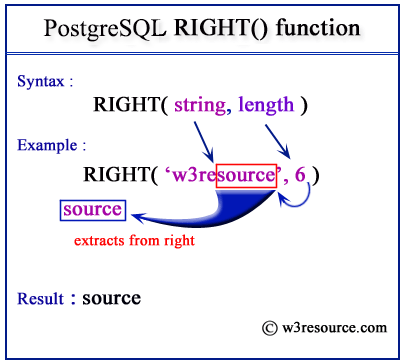PostgreSQL RIGHT() function
RIGHT() function
The PostgreSQL right() function is used to extract n number of characters specified in the argument from the right of a given string. When the value of n is negative, the extraction will happen from the right except for first n characters.
Uses of RIGHT() Function
- Extracting Substrings: Retrieve specific portions of a string from the right.
- String Manipulation: Modify text data by extracting characters from the end.
- Data Formatting: Format strings by extracting relevant suffixes.
- Conditional Extraction: Handle both positive and negative values for flexible substring extraction.
- Text Processing: Useful in scenarios where specific portions of string data are needed.
Syntax:
right(<string>,n)
PostgreSQL Version: 9.3
Visual Presentation of PostgreSQL RIGHT() function
Example 1: PostgreSQL RIGHT() function:
In the example below, the rightmost five characters from the string 'w3resource' have been extracted.
SQL Code:
SELECT right('w3resource',5);
Output:
right ------- ource (1 row)
Example 2:
In the example below, the right function extracted all the characters from the right side except 3 leftmost characters from the string 'w3resource', because the value of extracting character number is negative.
SQL Code:
SELECT right('w3resource',-3);
Output:
right --------- esource (1 row)
Previous: TRANSLATE function
Next: REVERSE function

